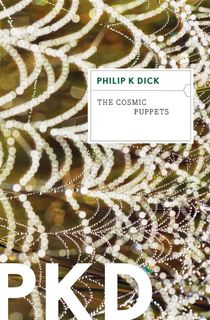Thanks to the release of the Blade Runner 2049 movie in 2017, as well as the series Philip K. Dick's Electric Dreams and The Man in the High Castle, Philip K. Dick’s name has been prominent in pop culture lately.
2017's Blade Runner 2049 was the sequel to the 1982 Blade Runner, which was loosely based on Dick's novel Do Androids Dream of Electric Sheep?.
Electric Dreams is an anthology series that premiered in 2017; each episode is based on one of Dick’s sci-fi short stories. The Man in the High Castle, the series finale of which aired in 2019, was loosely based on Dick’s novel of the same name and took place in an alternate history where the Axis powers won World War II.
Given the recent influx of adaptations of his work, it's clear Dick's vision of the future continues to captivate us. Nearly 40 years after his death, his vivid dystopian worlds and messages about human nature still compel readers. His themes of personal identity and what constitutes a human soul are particularly prescient now, in a time where the rise of artificial intelligence has begun to threaten the very profession of writing.
If you've never read one of Dick's books before, however, you're not alone. While Dick was regaled in the science fiction and fantasy community, winning the 1963 Hugo Award for Best Novel, he struggled to reach broad appeal or even to pay his bills. That said, his ideas and stories helped to make science fiction what it is today. His novels are not only brilliant and entertaining, they can also help offer a valuable insight into the foundation of speculative fiction as we know it today.
Without further ado, here are some Philip K. Dick books that every sci-fi fan should try.
Philip K. Dick's Classic Sci-Fi Novels

Philip K. Dick's Electric Dreams
Philip K. Dick wrote more than 100 short stories, and Electric Dreams includes some of the best of the best.
These mind-twisting tales are just as thought-provoking as his novels, from “The Impossible Planet,” in which a dying woman embarks on a voyage to see the mythical planet Earth; to the horror sci-fi story “The Hanging Stranger.” Also notable is “Exhibit Piece,” which follows a 22nd-century curator developing an exhibit on 20th-century American life.
The anthology was adapted into an Amazon series of the same name starring Janelle Monae, Anna Paquin, and Bryan Cranston.

The Cosmic Puppets
Ted Barton impulsively disrupts his vacation to bring his wife, Peg, to his hometown of Millgate, Virginia. But the town seems drastically different than Ted remembers from his childhood, and the locals have a much different understanding of the town’s past than Ted does.
A town drunk mentions an event called “the Change” that occurred nearly 20 years ago, and there’s a struggle over the town’s fate between two strange forces. Worst of all, try as he might, Ted can’t leave Millgate after he returns.

Do Androids Dream of Electric Sheep?
The inspiration for the movies Blade Runner and Blade Runner 2049, Do Androids Dream of Electric Sheep? is set in San Francisco in the aftermath of nuclear war. The Earth is largely barren and most animals have gone extinct.
Naturally, any remaining animal is expensive, so companies build artificial animals for those who can’t afford the real thing.
Likewise, on Mars, there are androids that can be acquired as servants or assistants. These human-like robots are banned from Earth, where humans fear their power.
Rick Deckard is a bounty hunter who takes a mission in the hopes of making enough money to buy a real sheep to replace his electric ones.
The mission is to kill six androids that went rogue and came to Earth — but the androids won't go down without a fight.
Do Androids Dream of Electric Sheep is quintessential Philip K. Dick and is one of his most influential works.
The novel manages to hit a sweet-spot between Dick’s more deeply philosophical speculative fiction and pure sci-fi accessibility.
Its proto-cyberpunk stylings also laid the groundwork for an entire subgenre and paved the way for the likes of Neal Stephenson, William Gibson, and Richard K. Morgan.

Ubik
Joe Chip is a technician working for Runciter Associates, a company that sends teams of “inertials” to protect their clients from psychic spies.
The company is run by Glen Runciter and his late wife Ella, who is suspended in a cryonic state that allows her limited consciousness and communication.
Chip, Runciter, and the company’s top team travel to the moon to secure a client’s lunar facilities, only to discover that the job was a trap.
Runciter is killed and the rest of the team is thrown into an altered reality, where time shifts and objects morph to resemble Runciter. The race is on to find what’s causing this altered reality before it kills them.
Ubik is an enthralling, bizarre and utterly uncompromising dive into speculative sci-fi. It is a novel steeped in paranoia with a deep-rooted sense of unease bordering on horror.
Ubik is a dose of weird fiction mixed with a heavy dash of satire held together by a mind-bending sci-fi narrative.

The Three Stigmata of Palmer Eldritch
In an attempt to improve conditions on Earth, the United Nations has begun drafting people to send to colonies on other planets.
But the quality of life is no better there. In fact, life is so bad on Mars that colonists have taken to using a psychedelic drug called Can-D to escape. Can-D users experience hallucinations, which they can share with other people, and take place in a simulated world inhabited by a character named Perky Pat.
Can-D has very little competition on the drug market, but when Palmer Eldritch arrives with a brand new drug, that monopoly is threatened.
Eldritch’s drug, Chew-Z, transports you to an idyllic world as well but is far more addictive and holds the promise of bringing you closer to God. In a world where everyone is taking mind-altering drugs, it’s nearly impossible to distinguish between reality and hallucination.
Philip K. Dick had a deep fascination with psychedelics and mind-altering substances – it’s a central part of much of his work. Much of his fiction dabbles in alternate realities and altered states of consciousness.
In Palmer Eldritch Dick pioneered a melding of weird fiction and speculative fiction that functions as a sort of spiritual successor to the works of writers like China Mieville and Jeff VanderMeer.

Clans of the Alphane Moon
Humans have housed their psychiatric patients on the third moon in the Alphane system for years. But when war breaks out between Earth and the Alphane system, the patients escape.
The former patients set up their own society, which revolves around their mental illnesses.
Eventually, Earth sends a group of doctors to bring back order, but the new colony is not interested. Led by those suffering from schizophrenia and paranoia, the colonists view the doctors as dangerous invaders and will stop at nothing to protect themselves from the foreigners.
While its an admittedly dark premise, Dick infuses the tale with a surprising amount of humor. At its heart, Clans of Alphane drops a high stakes tale of espionage and domestic strife into the center of sci-fi tinged examination of mental health, religion, and societal breakdown.

The Crack in Space
In 2080, Earth is facing a soon-to-be calamitous overpopulation crisis.
Terraforming the planet to support higher populations is a hot-button election topic for presidential nominees, until a warp drive malfunction results in a tear in space. This opens a portal to an alternate Earth where modern man never evolved, and plans are made to emigrate the cryogenically frozen masses to this new alternate universe.
But when the portal needs to be closed for five years halfway through the migration, a full century passes on this alternate Earth, resulting in a competing society and a sweet-talking leader to contend with.

Time Out of Joint
It’s 1959. Ragle Gumm spends his days winning a newspaper competition called “Where Will The Little Green Man Be Next?”. In his free time, Ragle enjoys a simple life, although it’s a bit different than the 1959 with which we’re familiar. Most notably, there’s no Marilyn Monroe in Gumm’s world.
Then, strange things start happening: Objects disappear and in their place are left slips of paper bearing the name of whatever disappeared.
Gumm also finds a magazine discussing Marilyn Monroe and a phone book that seem to have slipped from our world into his. When he tries to leave town, Gumm has a shocking revelation.
Time Out of a Joint is the epitome of Dick’s fascination with everyday people seeing reality as they know slowly unravel around them. It’s a rumination on the nature of existence, what constitutes reality, and the very concept of sanity.

The Man in the High Castle
What would have happened if the Allies lost the War? That’s exactly what Dick explores in this alternate history novel. In 1962, 15 years after the end of the Second World War, what was once the United States is ruled by Nazi Germany and Japan.
In San Francisco, part of the Japanese-occupied Pacific States of America, Chinese residents are considered second-class citizens and African-Americans are commonly forced into slavery.
The few remaining Jews fear for their lives and must hide under new identities.
The Man in the High Castle is arguably the best known alternate history novel – there’s a reason it’s a classic of the genre.
Not only is a deeply considered examination of a world altered by a single pivotal moment, it is ultimately lifted – and occasionally hindered – by Dick’s fascination with alternate realities, religion/philosophy, and altered states of consciousness.
It is an unimaginable yet at the same time terrifyingly believable alternate history.

The World Jones Made
Set in the year 2002, The World Jones Made is set on an Earth ravaged by atomic warfare. The globe is governed by the Federal World Government, which imposed leadership after the collapse of the United States, the People’s Republic of China, and the Soviet Union. The predominant law of the age is of Relativism, which states that everyone is free to believe what they want as long as they don’t try to amass followers.
Floyd Jones is tormented with the power to see one year into the future, and has grown nearly insane having to live in a world where harmful explorations of hedonism are considered as valuable as the noble pursuit of a united humanity.
Jones’ efforts to unite the people under a single ideology result in him becoming a charismatic leader without equal, but one with xenophobic followers.

Our Friends From Frolix 8
The “New Men” have incredible mental abilities. “The Unusuals” possess psionic powers of telekinesis, telepathy, and precognition. Both rule over 22nd-century Earth, controlling the “Old Men” — average humans who are considered archaic in this time.
Thors Provoni, the leader of the revolution, has returned from space after ten years with an alien companion, inspiring the rest of the story’s protagonists to regain hope for an end to the oppression. Somehow, a ninety-ton alien composed of slime is humanity’s greatest chance for liberation.

Flow My Tears, The Policeman Said
Jason Taverner is important. He’s a singer and the host of an extremely popular television show. Everything falls apart when wakes up one morning in a seedy hotel with no identification. Even worse, he seems to have never existed.
In the dystopian society where Jason lives, a totalitarian version of the United States, it’s illegal to go anywhere without identification.
If he’s caught without papers at a police checkpoint, he will be sent to a forced labor camp, no questions asked. With nowhere to turn, Jason goes on the run but can’t seem to escape a terrifying fate.
With a plot that hinges around weaponized parasites and experimental hallucinogens, Flow my Tears, The Policeman Said ranks as one of the weirder entries in Philip K. Dick’s canon.
It is nonetheless a challenging and provocative read that benefits from Dick’s unparalleled ability to blur the lines between the realities he creates within his narratives.

A Scanner Darkly
The basis for the 2006 film of the same name, A Scanner Darkly is set in a dystopian version of Orange County, California. Loosely based on Dick’s first-hand experience in 1970s drug culture, the novel follows Bob Arctor, who lives with a group of drug addicts. Bob is highly addicted to the psychedelic Substance D.
Fred is an undercover agent assigned to bring down Bob and his fellow junkies. It’s not as simple as it seems: Bob and Fred are one person.
Substance D has split the hemispheres of his brain so he operates as two separate individuals, unaware that he is living two very different lives.
Despite its mind-bending premise, A Scanner Darkly is Philip K. Dick at his most cynical and bleak. It is an unrelenting descent into the perils of addiction and while it features some of Dick’s best writing – indeed it is stands among his best novels – it is nonetheless a challenging read.

Radio Free Albemuth
In another alternate history, the United States is led by the corrupt Ferris F. Freemont. He was elected as president after Lyndon Johnson. Freemont uses his power as president to destroy civil liberties and disregard human rights.
A member of a right wing populist movement, Freemont is obsessed with a conspiracy theory involving an organization called Aramchek.
Radio Free Albemuth is somewhat autobiographical. Dick himself is a character in the novel, demonstrating Dick’s blatant distaste for the Republican Party and Richard Nixon. This dystopian novel is a powerful criticism of the political powers in the United States, reminiscent of Orwell’s Animal Farm and Bradbury’s Fahrenheit 451.
Interestingly, Radio Free Albemuth was originally written in 1976, but shelved after his publisher requested extensive rewrites. Dick reworked the plot of the novel into the Valis Trilogy, having the plotline appear as a film within the world of those novels.
Radio Free Albemuth was eventually published nearly a decade later following Dick’s death.

Now Wait for Last Year
In 2055, the Earth is engaged in a war with the planet Lilistar. Dr. Eric Sweetscent is an organ-transplant doctor who finds himself caught in the middle of the intergalactic conflict.
Previously the personal surgeon for the wealthy president of a fur manufacturing company, Dr. Sweetscent’s services have recently been transferred to the Mole, the leader of the Earth.
As Dr. Sweetscent struggles to figure out his role as a doctor working for a man who can come back from the dead, his wife Kathy develops problems of her own. She’s become addicted to a powerful drug that sends its user back and forth in time–totally randomly.
But Kathy's not willing to suffer alone. She’s determined to bring her husband down with her. Rife with the all-too-familiar struggles of balancing an imposing boss and familial obligations, Now Wait for Last Year presents a terrifying picture of what Earth might look like in the not-so-distant future.
Now Wait for Last Year is something of a cult favorite among Philip K. Dick’s fans and arguably doesn’t receive the mainstream appreciation it deserves.
While it is set against Dick’s penchant for reality altering escapades, it is, like his best work, an imaginative and thought-provoking examination of the nature of reality, of time, and an ordinary person’s struggle against decidedly extraordinary circumstance.

The VALIS Trilogy
The VALIS Trilogy is arguably the best distillation of Philip K. Dick’s fascination with religion, the nature of reality, and the self.
It is difficult to summarize the entire trilogy – it begins with a schizophrenic man having visions of an alternate world to a struggle against a fictional version of Richard Nixon who may be the devil incarnate to a struggle between a divine being and a dark god for the souls of the Earth.
The trilogy careens from hallucinatory visions to lucid dreams and apocalyptic scenarios.
In many ways, it is Philip K. Dick’s magnum opus – a bizarre, beguiling, and often challenging rumination on the themes that defined the Philip K. Dick canon.
It is both the apex of Dick’s eclectic literary style and his own philosophical underpinnings – from his fascination with religion to altered consciousness and our perceptions of reality and the self.
It is one of Philip K. Dick’s most difficult reads but also one of his most compelling and, ultimately, rewarding.

The Selected Short Stories of Philip K. Dick
No collection of Philip K. Dick must-reads would be complete without his groundbreaking short fiction. Philip K. Dick was an extraordinarily prolific writer partly out of obsessive creativity and partly out of sheer necessity.
He produced over 150 short stories over the course of his career, ranging from bizarre horror to absurdist comedy and mind-bending speculative fiction.
It is arguably in his short fiction that one can find the purest, most focused forms of Dick’s many, many philosophical and metaphysical ruminations.
Stories like Minority Report and We Can Remember it For You Wholesale (the basis for the film “Total Recall”) have become pop-culture touchstones. The short stories here are also a perfect introduction into the often decidedly strange imagination of Philip K. Dick.
Featured photo via Alchetron and Photoshop.
This post is sponsored by Open Road Media. Thank you for supporting our partners, who make it possible for The Portalist to celebrate the sci-fi and fantasy stories you love.












